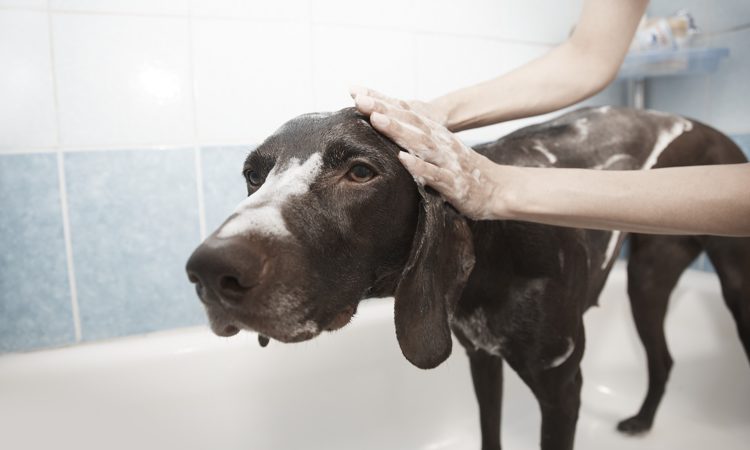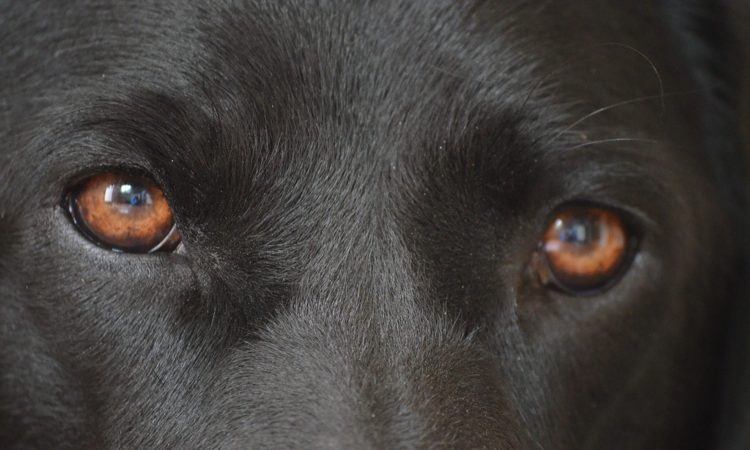The following advice has been provided by Dr Helen Johnston, Veterinary Surgeon at Village Vet, Winchmore Hill.
Cleanliness is next to godliness, so goes the old adage. But as most dog owners will know, the same isn’t always true for ‘dogliness’. As much as you love your dog, we’re willing to bet you’ve caught yourself exclaiming “Oh, you smelly dog”, or “You dirty doggy!” on more than one occasion.
Ever wondered how often you should bathe your dog, or the best way to keep your dog’s coat looking clean, shiny and healthy? Perhaps you’re here to brush up (sorry) on tips to keep your dog nasty-parasite-free, or on how best to clean sensitive areas like your dog’s ears and eyes. Whatever your question, we’ve put together some essential tips for keeping your dog a clean and healthy pooch.
How often should I clean my dog’s coat?

Some lucky dogs are blessed with coats that seem to stay clean and shiny no matter how many streams they jump in and how much fox poo they’ve rolled in. Think short haired pooches like Boston Terriers, Boxers, Great Danes, Weimaraners and others. Weekly grooming and the occasional bath for when they get really mucky is often all they’ll need.
For dog breeds breeds with longer, thicker coats (for example Golden Retrievers, Poodles, and Afghan Hounds) may need to be groomed more frequently.
Then there are those animals whose coats often seem to be greasy or flaky, or seem to itch a lot. In some of these more regular bathing can be beneficial – ingredients like oatmeal (check out our homemade oatmeal shampoo recipe) and pro-ceramides (the natural oils found in your dog’s skin to help keep in moisture) can help with coat condition and barrier function.
If you spot any of the above symptoms on a recurring basis, it’s a good idea to make an appointment with your vet. They may be able to suggest other treatments that could help – for example skin supplements or more specialised shampoos. Vets tend to see a lot of dogs that are itching due to allergies and in these cases there are other tests and prescription medications your vet may suggest and prescribe.
How often should I bathe my dog?

For most dogs you only need to do this when they actually get dirty or smelly; you can stick to this as the general rule. You might find that bathing more often than is strictly necessary actually dries your dog’s coat out – it’s full of natural oils that help to keep your dog healthy! In others that get a little itchy and flaky, bathing every few weeks may be needed.
On the other hand (or should that be ‘paw’?) with some dogs, such as Westies, we’d suggest bathing twice a week with a medicated prescription shampoo. If in doubt – ask your vet! Always make sure the preparation you are using is dog specific – no Johnson’s baby shampoo.
If your dog really doesn’t enjoy bath time, some vets will stock mousses that you can rub into the coat, leave to dry and then comb out – no need to wet or rinse your pooch, and less danger of getting splashed by a stubborn doggy!
How to keep my dog parasite free
There are plenty of parasite treatment products available, and you may find different vet practices suggest a slightly different routine. The following tips are what VillageVet tell dog owners about keeping their precious pooches parasite free, so if it differs slightly from what your own vet has advised please don’t panic!
- Monthly treatment with Advocate Spot-On, or similar products, onto the back of the neck. This covers your animal for fleas, lungworm (which they can pick up if they are in the habit of eating snails), a number of other intestinal worms and also some skin mites. You should avoid washing your dog for a few days both before and after applying this treatment.There are a number of other flea treatment products on the market, and the frequency of use for these may differ.
- Monthly tape-worming treatment until they are 6 months of age, and three-monthly thereafter. This is the protocol we are advising routinely, however in those families with young children it may be advisable to treat for tapeworms as often as monthly ongoing, as some of the worms found in your dog’s poo can be passed onto humans and cause gastrointestinal and even eye issues.
- In the spring and summer months it’s worth considering tick prevention strategies. Check your dog’s coat, especially around the feet, ears and neck when they come back from a walk. This is particularly important if they’ve been walking in long grass or forested areas. If any ticks are found they’re relatively straightforward to remove (again consult your vet for advice!). Vets can also prescribe tick collars that can be used in addition with the above treatments, or other types of flea treatment in lieu of Advocate (e.g. Bravecto, Nexguard) that also provide cover for ticks.
Parasite treatments are widely available in pet stores, but where possible we’d advise using prescription products from your vet. They may be a little more expensive, but only these are strong enough to kill those parasite nasties! Fleas and worms have high resistance to these store bought products and it’s not uncommon for our vets to see dogs that have been treated according to the product instructions return to our practices itching.
How to keep my dog’s ears clean and healthy

In the same way that dog’s grooming needs vary depending on their coats, dog’s ears also come in all shapes and sizes! Some dogs are lucky enough to have ears that stay pretty clean without any owner intervention.
If you notice a slight brown waxy buildup, wiping this away with a damp cloth or sponge may be adequate. We would advise never cleaning with cotton wool buds as if your dog starts wriggling you could inadvertently do some damage to their ear.
If you take your dog to a groomer you can also request that they clip the hair around the ear nice and short, as this often helps in maintaining cleanliness. There are liquid ear cleaners available that will reach deeper into the ear canal, but ideally see a vet before using these so we can ensure your dog’s eardrum is healthy and intact so as to avoid causing any damage.
If you ever notice your dog’s ear wax becoming more profuse or changing from brown to yellowish, or if your dog’s ear appears red or irritated (they are scratching it or shaking their head) they could certainly do with a visit to the vet to check for any infection, ear mites, or even a foreign body like a piece of grass that has worked its way down the ear canal during a walk.

Bear in mind certain breeds of dog, in particular those with long pendulous ears – like Cocker and Springer Spaniels or Basset Hounds tend to suffer more with ear issues due to the shape and structure of their ears – so it’s extra important to check your dog’s ears more regularly if you own one of these breed types.
Dogs that are regular swimmers, (eg: Poodles and Retrievers) also have more problems. If your dog is in and out of the vet with recurrent ear infections, your vet may suggest investigation into and treatment for underlying allergies as these can cause ongoing ear issues. Again, Westies are one of the main culprits for this! Finally, keeping up to date with parasite treatments like Advocate and Stronghold is advisable, as these treat your dog for ear mites.
How to keep my dog’s eyes clean and healthy

Small amounts of debris accumulating around your dog’s eyes can be perfectly normal and I am often recommending the use of moistened cotton wool balls or wipes to help remove light staining and dried discharge. If you opt to use wipes ensure these are suitable for your dog’s eyes, as other types of wipe may contain ingredients that could be irritant.
It may also help to keep the hair around your dog’s eyes short. If you ever notice your dog’s eyes looking red or irritated, or producing discharge that is yellow in colour or more profuse than you are used to – consult your vet.
Even in breeds where it’s normal to see a little more discharge than the “average” dog – for example Basset Hounds or English Bulldogs – it might still be worth a visit and an examination. Often, problems in these breeds are caused by the shape of the eyelids, and there are surgical procedures that can be carried out to correct this.
Wondering how best to care for your dog’s teeth? Read our expert advice from vets here.
